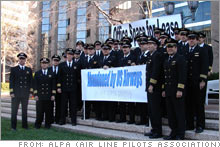If airline mergers fly, fares could followWhile some carriers tout savings, critics say deals would limit flyers' choices and boost fares in some markets.NEW YORK (CNNMoney.com) -- Airline passengers could soon face far fewer choices booking flights, and that could mean higher fares in many markets. The six major airlines could be reduced to just three or four after US Airways (Charts) bid for Delta last month and amid reports Wednesday that UAL (Charts), the parent of United, the nation's second-biggest airline, was in talks to buy No. 4 Continental Airlines (Charts).
Meanwhile, discount airlines could see their own round of deals after AirTran (Charts), one of the smaller low-fare carriers, made a hostile bid to buy rival Midwest Express (Charts) Wednesday. Some analysts and industry executives say the carriers need to merge to keep costs under control in an industry long plagued by excess capacity - one that only recently climbed out of a five-year slump that led to $42 billion in losses. But critics argue that the traveling public will be hurt by fewer choices, and that reduced capacity can do nothing but put upward pressure on fares. The proposed and reported deals have a series of opponents lining up against the bigger ones. "Any merger that takes out a brand takes out an option," said airline consultant Michael Boyd. "Whenever a consumer has less options, you're going to have higher fares. That's all there is to it." Experts say the talks being reported between United and Continental are very early and at least partly a reaction to US Air's offer for Delta. "This is just preliminary, nothing is imminent," said Ray Neidl, analyst with Calyon Securities. But he said that an AirTran-Midwest merger was likely. "With the [24 percent] premium being offered, I think it's a good chance of the deal getting done," said Neidl. "There's very little overlap, and relatively little in the way of regulatory hurdles." Atlanta-based AirTran offered $11.25 in cash and stock, or more than $200 million, to buy Midwest Express Holdings, a Milwaukee-based carrier. AirTran said Midwest had rejected the offer. "As the airline industry becomes more competitive and consolidations are more commonplace, a combination of our two companies ensures the best opportunity for serving our respective constituencies," AirTran CEO Joe Leonard said in a statement. "This will enhance our ability to provide value to travelers, protect the long-term security of our employees and generate significant economic benefits to Milwaukee, Atlanta and all the communities we serve." The proposal that sparked the recent takeover frenzy, the $8 billion hostile bid by No. 7 US Airways Group (Charts) for No. 3 Delta (Charts), will also get attention Wednesday. Delta management, which says it intends to emerge from bankruptcy as an independent carrier, is set to meet with a creditors' committee to urge them not to back the US Air offer. The reported move by United, meanwhile, is no surprise. Experts had predicted a rash of deals after US Air's offer for Delta, and United has made no secret of its desire to make an acquisition. "Our aspirations remain quite the same. We think consolidation is good for the industry," UAL finance chief Jake Brace said in comments to investors last month. "If it makes sense for us to participate in, we will." But Larry Kellner, the CEO of Continental, is on record as saying his airline prefers to stay independent, adding he's not convinced consolidation is as likely as widely assumed. "If industry consolidation occurs on a broader scale, it's very important. But I wouldn't put the probability that high," he said last month at an investors' conference. Kellner has one ace in the hole if he decides to say no to United or other possible buyers - Northwest Airlines has a so-called golden share in Continental that would allow it to block a deal for the carrier.
AirTran bids for Midwest Express
The moves toward consolidation came under fierce criticism from some industry observers. They say that even with with the rise of competition from low-fare carriers, some travelers are likely to see fare increases, especially when flying to or from second-tier markets. "The mantra is we need consolidation - that just means we're going to see a reduction in service in small and mid-size communities," said Boyd, the industry consultant. "A US Air-Delta deal is basically going to reduce competition along the East Coast." Kevin Mitchell, chairman of the Business Travel Coalition, an advocacy group, said business travelers would also face higher fares because of reduced capacity. "This is the ultimate warning of the 'tsunami' of airline industry consolidation most feared by business travel advocates," said Mitchell. "The market power of resultant, reconfigured global alliances with antitrust immunity could be stunning." But besides the fact no deals have been agreed to despite all the talk, any proposed mergers would face opposition from powerful airline unions and close scrutiny from regulators. The leaders of the Air Line Pilots Association at Delta are holding a rally Wednesday against US Air's bid for their airline, and they've been joined by both senators from Georgia and two members of the House as well. Neidl says he sees only a 30 percent to 40 percent chance of the US Air offer for Delta winning regulatory approval since some markets in the South and on the East Coast would lose most of the competition they now see. And there are competitive issues that go beyond that deal, he noted. "Washington will look at this very carefully. They know it's going to set off a round of consolidation," Neidl said. The man who is reshaping the airline industry |
|


